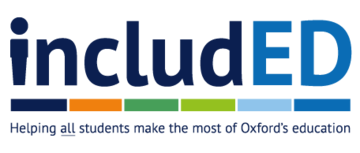Embedding digital education
Find out how we can help you achieve your educational ambitions
Expressions of interest for this consultancy service in 2024-25 have now closed
To be alerted when expressions of interest open for 2025-26, sign up to our mailing list.
Our vision is to create conditions throughout Oxford where excellence in teaching and assessment can thrive.
In 2024-25, we invite you to work with us on projects related to three key priority areas: (re)designing summative assessments, embedding digital education, and integrating academic skills (for colleges). Find out more about our consultancy services.
Find out below how we can work with you in 2024-25 on projects focussed on embedding digital education technologies, processes and pedagogies to ensure they are working well for you and your students.
The English Faculty approached the Centre for Teaching and Learning about supporting with planned improvements to Canvas. We wanted to ensure we had a student-centric approach and were able to make the most efficient use of the tools Canvas has to offer.
The team from the Centre were really communicative, and the information gathering they undertook enabled the English team to get a good oversight of where things currently stood with the Canvas set-up. The Centre have been great at providing information and suggestions of how we can move forward, giving us practical solutions whilst also helping forge a better understanding of what Canvas is capable of now, and may be capable of in the future.
We feel much better equipped to undertake a productive review of Canvas now, and knowing that the Centre is able to support this. This has made the whole process less daunting for everyone.
Zoe Hart, Education Manager, Faculty of English
What are some of the drivers at Oxford for embedding digital education?
If your department, faculty or course or programme team is interested in implementing changes to the ways in which you use Canvas and associated tools, we can work with you through the embedding digital education service.
We promote the role of digital education in inclusive and innovative teaching practices, as identified by the University's Digital Education Strategy 2023-27.
There are many other drivers for considering the embedding of digital tools, ranging from streamlining administrative processes, developing staff and students’ confidence and digital skills, improving access to formative feedback or encouraging students to collaborate with peers.
This consultancy opportunity is focussed on identifying the activities and interventions that will make a real difference to staff and students, embedding digital technologies, processes and pedagogies to ensure they are working effectively and helping you achieve your goals.
How will we work with you?
In this context, and recognising all parts of the University have different needs, we will work with divisions, departments or course teams, and in partnership with your students, to solve a strategic challenge, address an already identified requirement, or support an emerging opportunity underpinned by digital education tools and approaches.
If you are interested in working with us on embedding digital education within your course or programme, please contact us to organise a 'pre-meet' to discuss your requirements before completing our expression of interest form by the review dates below.
If you are an interested tutor or representing a college, please also contact us before completing the expression of interest form, so we can explore how we might work with you and discuss if there might be any associated costs.
|
EOI completion dates for 2024-25 |
|---|
|
|
|
|
|
|
|
|
What are some project examples?
Projects to embed digital education have already included:
- Worked with several departments including Chemistry and, Asian and Middle Eastern Studies to create bespoke documentation around Canvas processes to ensure knowledge was maintained as new staff joined
- Redesigned course homepages to provide a more accessible design and ensure consistency across departments such as MML, and Anthropology
- Co-designing bespoke templates for Continuing Education and Engineering.
- Working with English to streamline teaching and administrative processes around course management. Exploring how to better integrate tools such as the Canvas calendar, and working with staff to ensure they have the skills to confidently use these through bespoke training and documentation to facilitate internal knowledge transfer
- Designing workshops on key topics for The Language Centre to increase staff confidence with implementing FIT templates and using a broader range of tools and technologies in their teaching.
It is anticipated that by working with the Centre, departments, faculties, or course teams will be able to define what they want to do and how to achieve it, as well as implement a change in their use of digital education which improves the experience for students and staff.
Who can you contact for further information about this service?
Please contact us at contact@ctl.ox.ac.uk.
Further support
For immediate help with a digital education issue, please contact our dedicated Digital Education Service Desk at digital.education@ctl.ox.ac.uk. The service is available from Monday to Friday (8.30am to 5pm).
If you would like to connect with peers across Oxford to share digital education practice, you can join the Digital Education Technologies User Group. The user group is an online space for anyone interested in discussing how digital tools can support flexible and inclusive teaching and learning at the University.
We also recognise that many course and programme teams may wish to explore projects that span across embedding digital education. In our initial scoping meeting with you, it may emerge that a broader conversation might be of value.
Contact us
If you have a query, please contact us at
Stay informed



